Clauses & Phrases
Adjective Clauses
- Definition: A dependent clause that modifies a noun. This clause serves as the adjective (or one of the adjectives) for the sentence.
- Adjective clauses begin with conjunctions or pronouns (who, that, where, whom)
The house where I grew up is in Skokie
Adverbial Clauses
- Definition: Dependent clauses that modify verbs.
- Don’t forget your dependent marker words…or as some of these are called, subordinate conjunctions . These will help us signal an adverbial clause.
I will drive wherever the road takes me
Who cares about Adverbial Clauses?
- Identifying an adverbial clause is helpful because it can help us vary up sentence structure. You can usually move an adverbial clause within a sentence to improve sentence variation within your writing. (Just like with Independent & Dependent clauses)
Wherever the road takes me , I will drive.
Identify Any Clauses
The hostess wouldn't seat us because the restaurant was closed.
Adverbial clause
(Because the restaurant was closed)
Have you played with the game that I bought for you?
Adjective Clause
(that I bought for you)
I am not responsible for what my cats do when I am not home.
Adverbial Clause
(When I’m not home)
We can go swimming when it is warmer outside.
(when it is warmer outside)
If you promise to let his band play, Sean will come to your party.
(If you promise to let his band play)
The car that she is driving is not hers.
(that she is driving)
Combine these simple sentences by creating a sentence with an adjective or adverbial clause.
The man wants the money. He is here.
The fireworks will be starting. It isn’t dark enough.
I am going to the store. We are out of milk.
I went to get coffee with a girl. She sits behind me in French.
The play is starting at seven. It is the one I wanted to watch.
I like to go sledding. It is snowing.
Prepositional Phrases
- What is a prepositional phrase?
- A prepositional phrase includes a preposition, a noun or pronoun called “the object of the preposition” and any modifiers of that object.
- In other words, it includes a preposition, the noun or pronoun that the preposition is affecting and any adjectives that modify the noun.
The man lived under the bridge
Prepositional Phrases Type #1: Adjective Phrases
- What is an adjective phrase?
- An adjective phrase is a prepositional phrase that is used to modify a noun.
- How is this different than an adjective clause?
- Adjective phrases begin with prepositions, while adjective clauses begin with pronouns.
She lived in the house beside the river .
Prepositional Phrases Type #2: Adverb Phrases
- What is an adverb phrase?
- An adverb phrase is a prepositional phrase that is used to modify a verb, adjective or another adverb.
- How is this different than an adverbial clause?
- Adverb phrases begin with prepositions. Adverbial clauses begin with subordinate conjunctions.
She ran behind the shed .
Let’s Practice
Identify whether the phrase is an adjective phrase or adverb phrase.
She lay beside the still waters .
Adverb phrase
The house across the street is falling down.
Adjective Phrase
The cat fell down the well .
The words inside the book were difficult to read.
Adjective phrase
Identify the prepositional phrase and whether it is an adjective or adverb phrase.
The car near the house belongs to Jimmy.
Near the house, adjective
She ran towards the fire.
Towards the fire, adverb
The light upon the hill burns brightly.
Upon the hill, adjective
The store past Barnes and Noble is still open.
Past Barnes and Noble, adjective
The car drove off the edge of the cliff.
Off the edge, adverb
Of the cliff, adjective

Module 12: Grammar Basics
Phrases and clauses, learning objectives.
- Differentiate between phrases and clauses
- Differentiate between dependent and independent clauses
Phrases and clauses are groups of words that act as a unit and perform a single function within a sentence. A phrase is a group of words that may have a partial subject or verb but not both, or it may have neither a subject nor a verb. Phrases never have a subject doing the action of a verb. A clause , however, is by definition a group of words that has a subject and a verb. A sentence can have any number of clauses and phrases combined together. See the examples below:
Notice how each of the clauses has a subject and a verb, but the phrases do not. Some of the clauses contain phrases, like “She laughs at shy people.” “She laughs” is a clause, and “at shy people” is a phrase that complements the clause and completes the sentence.
Phrases can be any combination of words that do not combine a subject and a verb. There are many types of phrases, including noun phrases ( the nice neighbor , my best friend , troops of soliders ), verbal phrases ( waiting for the rain to stop , have been sleeping ), and prepositional phrases , which follow a preposition ( after the storm , to the end of time , in the road ).
You might be tempted to just assume that phrases are shorter than clauses. This is not always true. Many phrases are only two words long, but many are much longer. Look at the following sentence:
- In 1833 , Faraday’s experimentation with electrolysis indicated a natural unit of electrical charge , thus pointing to a discrete rather than continuous charge .
Each of the bolded segments of this sentence is a phrase. Be sure as you analyze each sentence that you are looking for a subject and a verb to decipher what is a clause and what is just a phrase.
Click through this interactive to learn more about the differences between clauses and phrases.
Dependent and Independent Clauses
There are two types of clauses: dependent and independent. A dependent clause has both a subject and a verb, but is not a complete sentence and does not express a complete thought. It is dependent on something else: it cannot stand on its own. Some examples of dependent clauses include:
- When we get enough snow
- Because I was upset
- Which book I want to read next
- Until the sun sets
You can see that each of these clauses has a noun and a verb, but they also have an additional word, like a subordinating conjunction ( because ) or a relative pronoun ( which ), which makes the clause feel incomplete. These clauses must be attached to an independent clause to be a part of a complete sentence.
An independent clause , on the other hand, is free to stand by itself. It contains a subject and a verb, and expresses a complete thought which does not require anything else. Here are some examples of independent clauses:
- I enjoy sitting by the fireplace.
- The sun set.
- This is the book I want to read next.
So how can you tell if a clause is dependent or independent? Sometimes they can be almost exactly the same. For example, “I was a little girl in 1995” is an independent clause, but “Because I was a little girl in 1995” is a dependent clause.
Look for the common words that are known to make dependent clauses, like subordinating conjunctions and relative pronouns. Some common ones are: after , although , as , as if , because , before , even if , even though , if , in order to, since , though , unless , until , whatever , when , whenever , whether , and while . Also pay attention to if the clause makes sense standing by itself. Do you understand the whole idea of what the sentence is saying? Does the thought seem incomplete? If it feels incomplete, it is probably a dependent clause.
Watch this video to learn more about dependent and independent clauses.
You can view the transcript for “Dependent and independent clauses” here (opens in new window) .
Contribute!
Improve this page Learn More
- Phrases and Clauses Interactive. Authored by : Excelsior OWL. Located at : https://owl.excelsior.edu/esl-wow/editing-polishing/check-punctuation/esl-basic-sentence-structure/ . License : CC BY: Attribution
- Text: Parts of a Sentence. Provided by : Lumen Learning. License : CC BY: Attribution
- Phrases and Clauses Additional Content. Authored by : Alyse Leininger for Lumen Learning. License : CC BY: Attribution
- Dependent and Independent Clauses. Authored by : Khan Academy. Located at : https://www.khanacademy.org/humanities/grammar/syntax-sentences-and-clauses/phrases-and-clauses/v/dependent-and-independent-clauses-syntax-khan-academy . License : CC BY: Attribution . License Terms : Standard YouTube License


- My presentations
Auth with social network:
Download presentation
We think you have liked this presentation. If you wish to download it, please recommend it to your friends in any social system. Share buttons are a little bit lower. Thank you!
Presentation is loading. Please wait.
To view this video please enable JavaScript, and consider upgrading to a web browser that supports HTML5 video
Sentences, Phrases, and Clauses
Published by Abner Lee Modified over 8 years ago
Similar presentations
Presentation on theme: "Sentences, Phrases, and Clauses"— Presentation transcript:
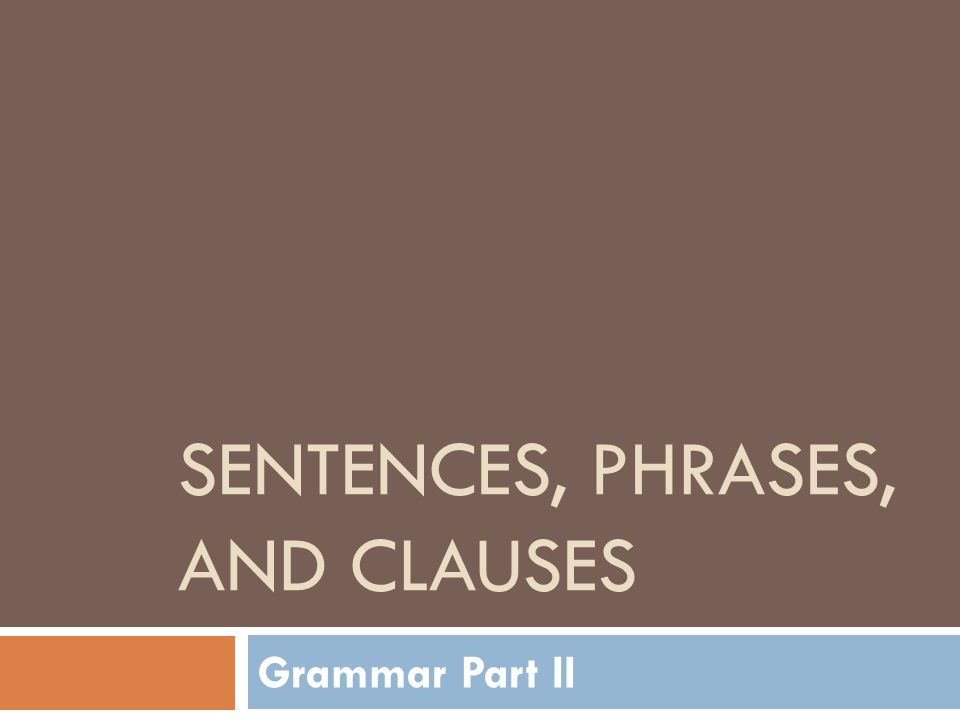
Verbals and Verb Phrases

Asst. Prof. Dr. Suwaree Yordchim Suan Sunandha Rajabhat University

Language Network Pg. 92. Independent Clause – Contains a subject, a verb, conveys a complete thought, and is also know as a complete sentence Subordinate.

Clauses and Sentence Structure

Phrases. Prepositional Phrases A prepositional phrase always begins with a preposition and ends with an object ( a noun or pronoun). A prepositional phrase.

Grammar. What you will need to know for the quiz: Phrases Irregular Verbs: to lie vs. to lay Clauses Need to review? Four kinds of sentences Four kinds.

Phrases & Clauses.

Classifying Sentences by Structure

Independent/Subordinate Adjectives

Tuesday, December 2 GUM 5.7 Composition 3.7 Literary Analysis and Composition

Parts of Sentences. Subjects and Predicates Sentence: is a group of words that expresses a complete thought. Subject : is the part of the sentence that.

Subject performs the actions Example: › The dog chased the cat. (Active)

Independent vs. Subordinate

English II Sentence Notes. So… what is a sentence? A sentence is a group of words with a subject and a verb that expresses a complete thought. Ex. The.

November 11, \EOCT Prep\Conventions Worksheet.docx.

Assistance. Identify the Part of Speech of each word in this week’s sentence. Noun: Person, place, or thing Pronoun: Replaces a noun (he, she, we, etc.)

Are the following groups of words sentences? Birds fly. Toni bought. Our mechanic is. Richard feels.

DGP TUESDAY NOTES (Sentence Parts and Phrases)

Daily Grammar Practice

© 2006 SOUTH-WESTERN EDUCATIONAL PUBLISHING 11th Edition Hulbert & Miller Effective English for Colleges Chapter 9 SENTENCES: ELEMENTS, TYPES, AND STRUCTURES.
About project
© 2024 SlidePlayer.com Inc. All rights reserved.
If you're seeing this message, it means we're having trouble loading external resources on our website.
If you're behind a web filter, please make sure that the domains *.kastatic.org and *.kasandbox.org are unblocked.
To log in and use all the features of Khan Academy, please enable JavaScript in your browser.
Course: Grammar > Unit 8
- Phrases and clauses
Introduction to phrases and clauses
- Dependent and independent clauses
- Phrase and clause placement
- Relative clauses
Dorothy asked for a glass of water after she invited herself in.
- (Choice A) phrase A phrase
- (Choice B) clause B clause
phrase and clause presentation
All Formats
Resource types, all resource types.
- Rating Count
- Price (Ascending)
- Price (Descending)
- Most Recent
Phrase and clause presentation
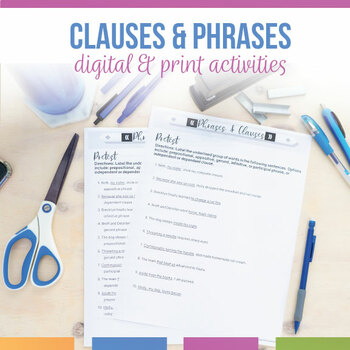
Phrases and Clauses Grammar Worksheets, Presentation , Test, Flipping Book

Clauses and Phrases (PowerPoint Presentation + Google Activity + Easel)

- Google Drive™ folder
- Easel Activity
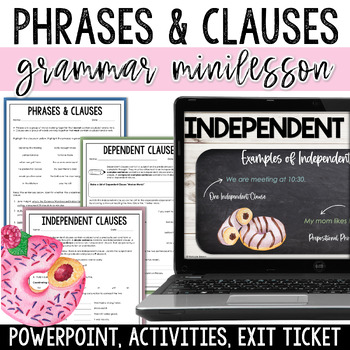
Phrases and Clauses Mini Lesson & Worksheets - Independent and Dependent Clauses

- Google Apps™
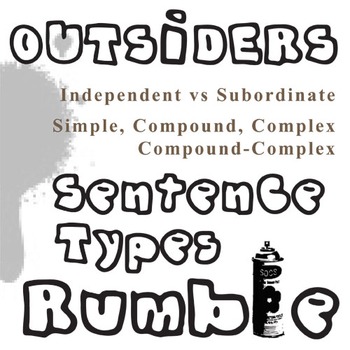
THE OUTSIDERS Phrases , Clauses , and Sentence Types Activity and PowerPoint

Clauses and Phrases - Independent vs. Subordinate Review Game - Grammar Ninja
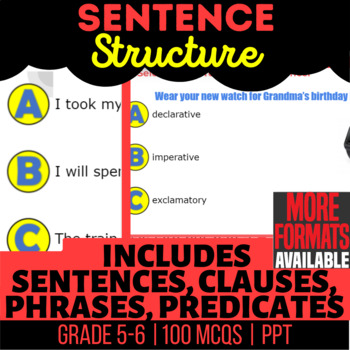
Sentence Structure PowerPoints Types of Sentences Clauses Phrases and Predicates

- Easel Assessment
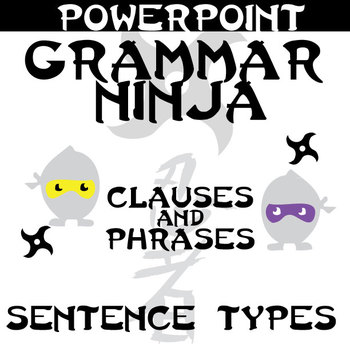
Clauses & Phrases - 4 Types of Sentences Review Game (Grammar Ninja is Hilarious
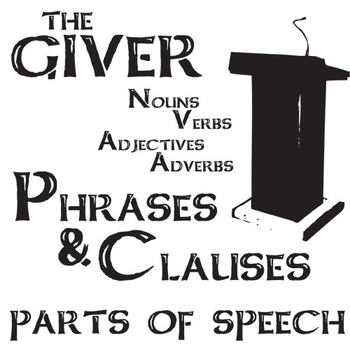
THE GIVER Phrases and Clauses Grammar (Noun, Verb, Adjective, Adverb) Lowry
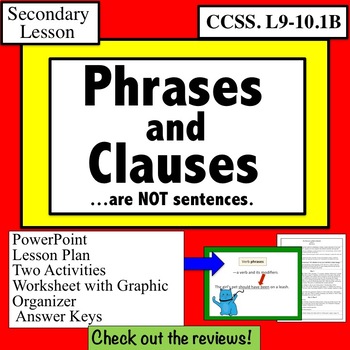
Phrases and Clauses

Sentence Structure Activities Types of Sentences Clauses Phrases and Predicates
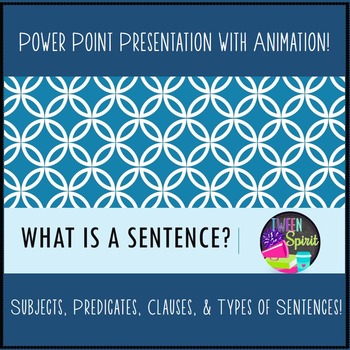
Types of Sentences: What is a Sentence? Presentation , Practice, and Notes

Grammar color notes: Phrases and clauses
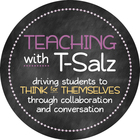
Phrases and Clauses Unit: Adjective and Adverbs (Opening and Delayed)
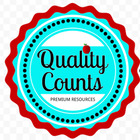
Phrases & Clauses Part 1: Phrases

Phrases & Clauses Part 2: Clauses

Unit 4 Patters of Power Grades 6-8 Chapter 7 " Phrases and Clauses " Editable.

Phrase vs. Clause and Types of Sentences and Escape Room Activity

Phrases and Clauses : Stickman in Peril!
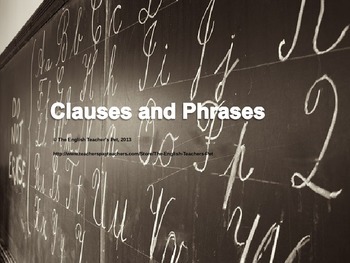
Clauses and Phrases PowerPoint

Phrases and Clauses Minilesson, Doodle Notes, and Activity - 7th Grade Grammar

ELA L1: Phrases and Clauses (PowerPoint)

Phrases and Clauses Lesson (Google Drive Version)

Adverb Clauses - Presentation , Worksheet, Graphic Organizer, Activity
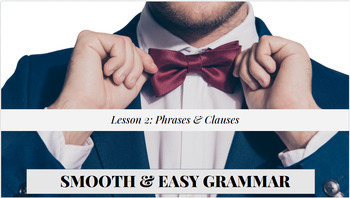
Smooth & Easy Grammar: Lesson 2 Phrases and Clauses
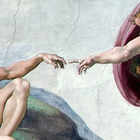
- Google Slides™
- We're hiring
- Help & FAQ
- Privacy policy
- Student privacy
- Terms of service
- Tell us what you think
- International
- Schools directory
- Resources Jobs Schools directory News Search


SPaG Presentation: Phrases, Clauses (Main, Subordinate and Relative) and Conjunctions
Subject: English
Age range: 7-11
Resource type: Other
Last updated
22 February 2018
- Share through email
- Share through twitter
- Share through linkedin
- Share through facebook
- Share through pinterest
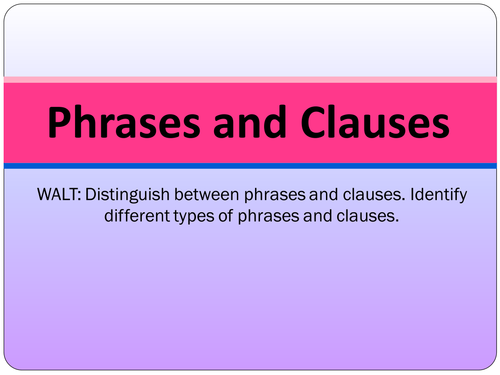
Creative Commons "NoDerivatives"
Your rating is required to reflect your happiness.
It's good to leave some feedback.
Something went wrong, please try again later.
Thank you very much for this. It is great for revision, or for use in chunks as the starter for lessons.
Empty reply does not make any sense for the end user
JoannaParry
A great resource covering many aspects to dip into for revision - thank you :)
A very clear ppt that will be extremely useful, thank you
tarinscharneck
Brilliant - exactly what I was looking for - thank you.
Report this resource to let us know if it violates our terms and conditions. Our customer service team will review your report and will be in touch.
Not quite what you were looking for? Search by keyword to find the right resource:
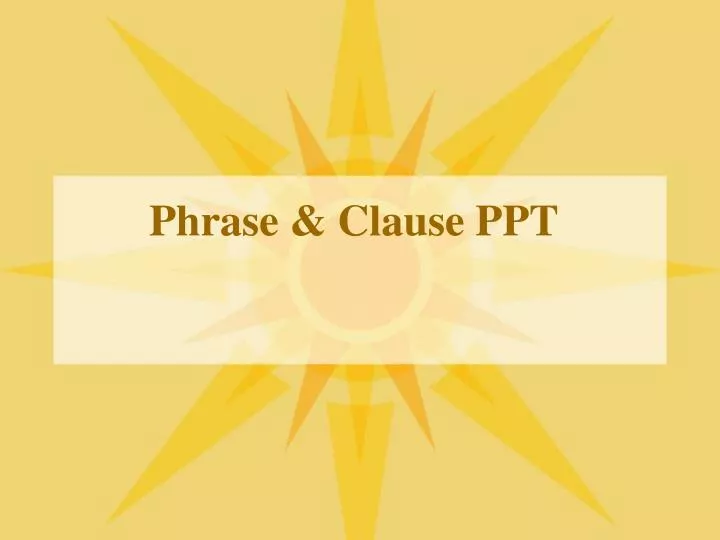
Phrase & Clause PPT
Jul 28, 2014
1.23k likes | 2.9k Views
Phrase & Clause PPT. Webs. Grammar. Phrases & Clauses Which of the following are phrases and clauses? 1.In my room—Phrase 2.The cat went under the bed—Clause 3.Until next week P or C—why? 4. Quickly walking to the store P or C—why? 5.Yet they tried—P or C—why?. Phrases & Clauses.
Share Presentation
- prepositional phrase
- studentsin class
- adjective phrases
- dependent clause
- next week p

Presentation Transcript
Phrase & Clause PPT
Grammar • Phrases & Clauses • Which of the following are phrases and clauses? 1.In my room—Phrase 2.The cat went under the bed—Clause 3.Until next week P or C—why? 4. Quickly walking to the store P or C—why? 5.Yet they tried—P or C—why?
Phrases & Clauses Phrase: group of related words that does not contain a subject and verb and is used as a part of speech Clause: a group of words that contains a subject and a verb and is used as part of a sentence or a sentence by itself.
Day 2 Fill in the blanks: A phrase is a group of related words that is used as a part of ______ and does not contain both a _______ and a _______. A phrase ______ stand alone as a sentence A clause has both a _______ and a _______. A clause _______ stand alone as a sentence if it’s an independent clause.
Day 2 Fill in the blanks: A phrase is a group of related words that is used as a part of speech and does not contain both a subject and a verb. A phrase cannot stand alone as a sentence A clause has both a subject and a verb. A clause can stand alone as a sentence if it’s an independent clause.
Identifying phrase & clauses The ski lift broke after we got on it. Against the wall. For a while. Tomorrow we will go. Until the end of the week. Have gone running for an hour. Before you know it, it will be summer.
Adjective Phrase An ADJECTIVE PHRASE is prepositional phrase that is used to modify a noun. Example: Adj: Icy chunks fell from the sky. Adj. phrase: Chunks of ice fell from the sky. Adj: I ordered a spaghetti dinner. Adj. phrase: I ordered a dinner of spaghetti.
Identify the adjective phrase & the word it modifies. Students in my class are intelligent, lovely people. My cat with the blue eyes is named Baby. There was only enough room for you. The pants with big pockets look weird.
Identify the adjective phrase & the word it modifies. Studentsin my class are intelligent, lovely people. My catwith the blue eyes is named Baby. There was only enough roomfor you. The pantswith big pockets look weird.
Adjective Phrases Cont’d • Sometimes there will be two adjective phrases in a row • The two phrases COULD modify the subject (noun) Ex. I love the paintingof flowers by Van Gough OR • The second adjective phrase could modify an object in the first adjective phrase • Ex. A numberof the paintings by Van Gough are in US museums.
The importance of studying before tests cannot be denied. The topics of importance in a unit are usually covered on the study guide. Study guides with review questions on them help you focus your studying.
Clause • A word group that contains a subject and verb • Two types of clauses: • Independent– expresses a complete thought & can stand by itself as a sentence • Dependent-(subordinate)-does not express a complete thought & cannot stand by itself as a sentence
Dependent Clause A clause that has a subject + verb BUT does NOT express a complete thought + CANNOT stand alone as a sentence. Start with SUBORDINATING CONJUNCTIONS
Check for Understanding Identify the subject & verb & determine if it’s an independent or dependent clause: Whose aunt rode on the space shuttle His aunt rode on the space shuttle Where I grew up. I grew up here.
Write a sub clause for your vocab words: adjourn, cease, decisive Start with a subordinating Conjunction:
Independent Clause A clause that has a subject =+ verb + expresses a complete idea + can stand by itself as a sentence.
- More by User
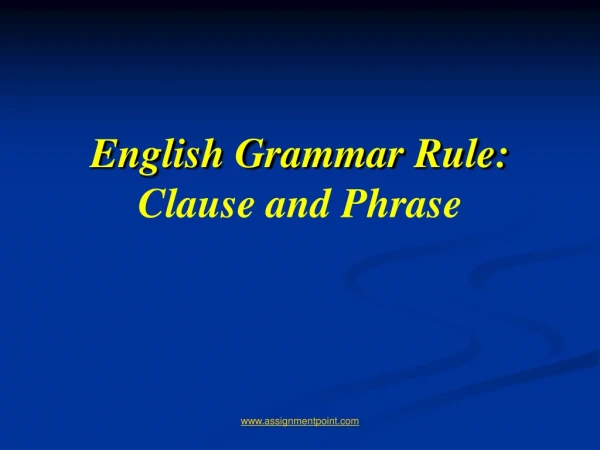
English Grammar Rule: Clause and Phrase
English Grammar Rule: Clause and Phrase. Clause when he gets the money (This has a subject [he] and a verb [gets], but you’re left dangling, aren’t you? It’s not a complete sentence. This is called a dependent clause. It depends on something else to make a complete sentence. Complete Sentence
514 views • 12 slides
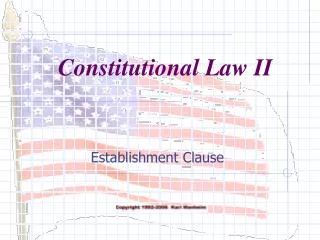
Establishment Clause
Establishment Clause. Introduction. “Congress shall make no law respecting an establishment of religion,” “or prohibiting the free exercise thereof;” Interpretivist methodologies Textualist Originalist Dynamic External. Both clauses seen as protecting religious freedom.
580 views • 22 slides
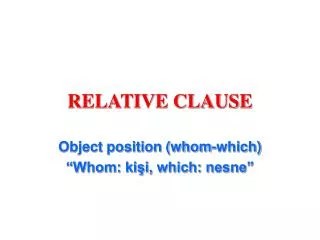
RELATIVE CLAUSE
RELATIVE CLAUSE. Object position (whom-which) “Whom: kişi, which: nesne”. Object pronouns. I love Ali. I love him . I love Leyla. I love her . I love Ali and leyla. I love them . I love you and your friends . I love you .
241 views • 21 slides

Clause Types
Clause = subject predicate. subject: the NP being assigned a propertypredicate: the property being assigned to the subjectThe man leftSusan is a linguistics student. Main vs. Embedded. Main clause (also called Root) is the highest clauses.Embedded clauses (also called subordinate clauses) are
453 views • 13 slides

If clause. TYPE 0: expresses general truths & facts IF + SIMPLE PRESENT + SIMPLE PRESENT If you heat water to 100 degrees Celsius, it boils . When you drink too much, you get drunk. . TYPE 1 : expresses a possibility for the PRESENT or FUTURE
1.18k views • 28 slides
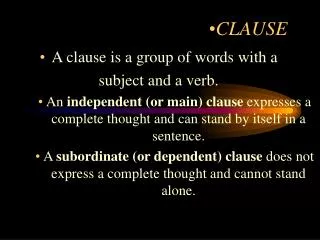
CLAUSE. A clause is a group of words with a subject and a verb. An independent (or main) clause expresses a complete thought and can stand by itself in a sentence. A subordinate (or dependent) clause does not express a complete thought and cannot stand alone. INDEPENDENT CLAUSES.
382 views • 21 slides
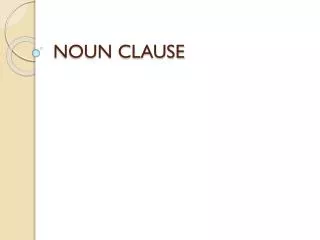
NOUN CLAUSE
NOUN CLAUSE. WHAT IS A NOUN?. Definitions of Noun The English word “ noun ” comes from the Latin ‘ nomen ’ meaning ‘ name ’. The function of noun is to name someone or something.
558 views • 10 slides
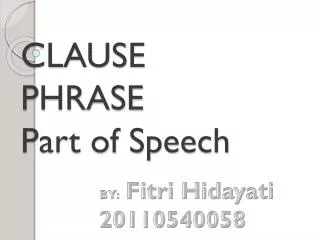
CLAUSE PHRASE Part of Speech
CLAUSE PHRASE Part of Speech. BY: Fitri Hidayati 20110540058. Independent Clause. Also called main clause (induk kalimat) is a series of words containing a subject and predicate which has had a perfect understanding (obviously), and can stand alone, that is not dependent on another clause.
1.4k views • 54 slides
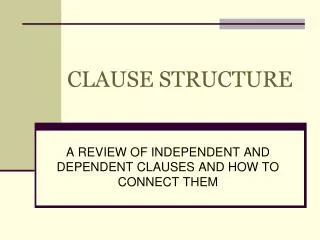
CLAUSE STRUCTURE
CLAUSE STRUCTURE. A REVIEW OF INDEPENDENT AND DEPENDENT CLAUSES AND HOW TO CONNECT THEM. What is a Clause?. A clause is a group of related words that contains both a subject and a verb. Two Types of Clauses: Independent Clause Dependent Clause. Independent Clause.
651 views • 26 slides
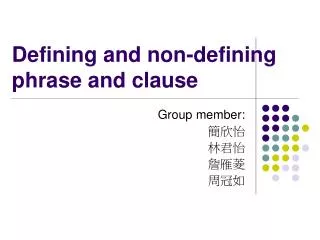
Defining and non-defining phrase and clause
Defining and non-defining phrase and clause. Group member: 簡欣怡 林君怡 詹雁菱 周冠如. Defining clause. Mr. Wang has a son who lives in Taichung . ( 王先生有個住在台中的兒子 ) “ 限定用法 ” , 指王先生不只一個兒子 , 因為不只一個 , 所以我描述時 , 必須限定是住在台中的那一個。. Non-defining clause.
482 views • 12 slides

The “Clause”
Let’s see what we can unwrap with…. The “Clause”. As you know, a clause is…. Group of words with a subject & verb May or may not be a complete sentence. Sorry, nothing to do with Santa…not even spelled the same. What about Santa???. Santa Claus does not have an “e” on the end.
360 views • 18 slides
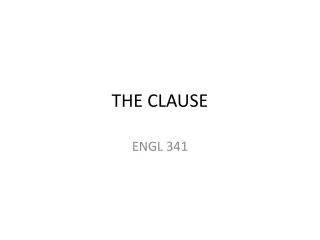
THE CLAUSE . ENGL 341. The clause . A clause contains some form of a verb and subject in it Thus, the number of verbs in a sentence corresponds to the number of clauses in it We should therefore be able for a start to identify the number of clauses in the ff structures:
474 views • 22 slides

Lc 1.3 Use Subordination, Coordination, Apposition, And Other Devices To Indicate Clearly The Relationship Between Ideas. Clause. A group of words containing a subject and a verb and forming part of a compound or complex sentence. Example: Mrs. Mazzotta is running five miles today. .
307 views • 8 slides
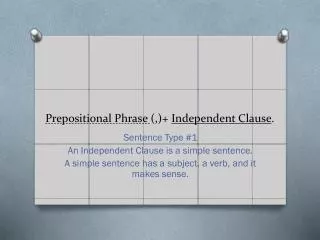
Prepositional Phrase (,)+ Independent Clause .
Prepositional Phrase (,)+ Independent Clause . Sentence Type # 1 An Independent Clause is a simple sentence. A simple sentence has a subject, a verb, and it makes sense. . Common Prepositions. of in to for with on at from. by about as into like through after over. between
302 views • 11 slides
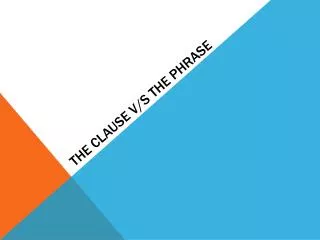
The Clause v/s The Phrase
The Clause v/s The Phrase. The Difference?. PHRASE – I s a word group that does NOT have a subject and a verb that is used as a single part of speech. CLAUSE- Is a word group that contains a verb and its subject & that is used as a sentence or as part of a sentence. TWO Clauses .
263 views • 12 slides

The Clause. Independent and Subordinate. Lesson Objectives. I can identify independent and subordinate clauses in writing I can write sentences using independent and subordinate clauses. I can explain the function of the clause when examining a sentence. The clause defined:.
446 views • 16 slides

Noun clause
Noun clause. Let’s start. Tomoda. What’s a Noun !. A noun is a word used to name a person, animal, place, thing, and abstract idea. A Cat. Tomoda. What’s a Noun !. Remember 1. A noun is a part of speech. 2. Subjects and objects are parts of a sentence.
815 views • 22 slides
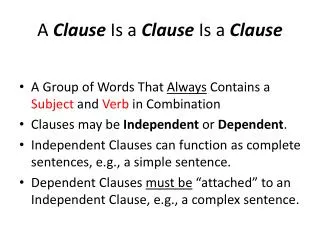
A Clause Is a Clause Is a Clause
A Clause Is a Clause Is a Clause. A Group of Words That Always Contains a Subject and Verb in Combination Clauses may be Independent or Dependent . Independent Clauses can function as complete sentences, e.g., a simple sentence.
400 views • 14 slides
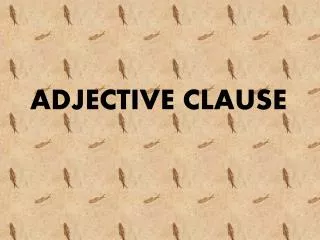
ADJECTIVE CLAUSE
ADJECTIVE CLAUSE . The term :. Adjective Clause . Subject . Object. Subject Object. Example . Do you know the staff? He will be promoted as our new division manager. Do you know the staff who will be promoted as our new division manager?
245 views • 4 slides
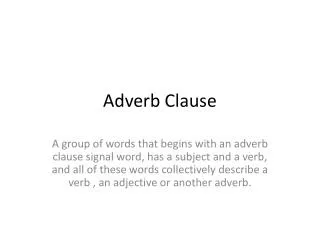
Adverb Clause
Adverb Clause. A group of words that begins with an adverb clause signal word, has a subject and a verb, and all of these words collectively describe a verb , an adjective or another adverb. Adverb Clause Signal Words. After Although As As if As long as As soon as Because Before If
304 views • 5 slides

ADJECTIVE CLAUSE. By: Joshua M. Capul. ADJECTIVE CLAUSE. A dependent clause used as an adjective within a sentence . Also known as an adjectival clause or a relative clause . ADJECTIVE CLAUSE. usually begins with a relative pronoun .
945 views • 7 slides

Relative Clause
Relative Clause. [email protected] 0853 68259178. We use relative clauses to give additional information about something without starting another sentence. By combining sentences with a relative clause, your text becomes more fluent and you can avoid repeating certain words.
405 views • 9 slides
- English Grammar
- Phrases And Clauses
Phrases and Clauses - Meaning, Types, Differences and Examples
In any language , a sentence can be divided into various parts. Phrases and clauses are one among the divisions that can be done. In this article, you will learn what phrases and clauses are, how they can be used and the difference between them. The article also gives you a number of examples to give you a clearer idea of the topic.
Table of Contents
What is a phrase – meaning and types, what is a clause – meaning and types, difference between phrases and clauses, examples of phrases and clauses, check your understanding of phrases and clauses, frequently asked questions on phrases and clauses in english grammar.
A phrase is a part of a sentence which consists of a group of words that give more information about the subject, action or event in a sentence. A phrase cannot stand on its own and will not convey meaning if separated from the sentence. According to the kind of function it does, it can be classified into various types and they include the following.
- Noun Phrase
- Verb Phrase
- Adverb/Adverbial Phrase
- Prepositional Phrase
- Adjective/Adjectival Phrase
A clause is also a part of a sentence that consists of a subject and a verb, unlike phrases. They can be divided into two main types depending on how they behave in a sentence. The different types of clauses are:
- Main Clause or Independent Clause
- Subordinate Clause or Dependent Clause
Take a look at the table given below to find out how phrases and clauses differ from each other.
To understand how phrases and clauses can be used, take a look at the following sentences.
- Anu and Teena (noun phrase)
- Have been searching (verb phrase)
- Beside the trees (prepositional phrase)
- Extremely well (adverb phrase)
- The house on 6 th street (noun phrase)
- As soon as I reach the office (dependent or subordinate clause)
- I did not bring my umbrella. (independent clause)
- When the little boy saw his mom (dependent or subordinate clause)
- Collect your parcel from the courier office. (independent clause)
- Though we left home early (dependent or subordinate clause)
Identify the phrases and clauses in the following sentences and state which of them is a phrase and a clause.
1. I completed my project, but I was not satisfied with it.
2. Jacob knew about it; however he kept asking everyone about it.
3. I was waiting at the park.
4. They all sang extremely well.
5. The girls in the black dresses are the ones who won the competition last year.
6. In the meantime, I will help you with your domestic chores.
7. Santana and Brittany are good dancers.
8. When we reach home, we will call you.
9. We were planning our summer vacation.
10. She finally agreed to come with us to the slumber party.
Now, check your answers to find out if you identified the phrases and clauses correctly.
1. I completed my project, / but I was not satisfied with it.
Clause / Clause
2. Jacob knew about it; / however he kept asking everyone about it.
3. I was waiting / at the park.
Clause / Phrase
4. They all sang / extremely well.
5. The girls in the black dresses are the ones / who won the competition last year.
6. In the meantime, / I will help you with your domestic chores.
Phrase / Clause
8. When we reach home, / we will call you.
10. She finally agreed to come with us / to the slumber party.
What is a phrase?
A phrase is a part of a sentence which consists of a group of words that give more information about the subject, action or event in a sentence. A phrase cannot stand on its own and will not convey meaning if separated from the sentence.
What is a clause?
A clause is also a part of a sentence that consists of a subject and a verb, unlike phrases.
What are the types of phrases?
According to the kind of function it does, it can be classified into various types and they include the following.
What are the types of clauses?
Clauses can be divided into two main types depending on how they behave in a sentence. The different types of clauses are:
Give some examples of phrases.
Here are some examples of phrases for your reference.
Give some examples of clauses.
Here are some examples of clauses for your reference.
Leave a Comment Cancel reply
Your Mobile number and Email id will not be published. Required fields are marked *
Request OTP on Voice Call
Post My Comment
- Share Share
Register with BYJU'S & Download Free PDFs
Register with byju's & watch live videos.

- SUGGESTED TOPICS
- The Magazine
- Newsletters
- Managing Yourself
- Managing Teams
- Work-life Balance
- The Big Idea
- Data & Visuals
- Reading Lists
- Case Selections
- HBR Learning
- Topic Feeds
- Account Settings
- Email Preferences
How to Make a “Good” Presentation “Great”
- Guy Kawasaki

Remember: Less is more.
A strong presentation is so much more than information pasted onto a series of slides with fancy backgrounds. Whether you’re pitching an idea, reporting market research, or sharing something else, a great presentation can give you a competitive advantage, and be a powerful tool when aiming to persuade, educate, or inspire others. Here are some unique elements that make a presentation stand out.
- Fonts: Sans Serif fonts such as Helvetica or Arial are preferred for their clean lines, which make them easy to digest at various sizes and distances. Limit the number of font styles to two: one for headings and another for body text, to avoid visual confusion or distractions.
- Colors: Colors can evoke emotions and highlight critical points, but their overuse can lead to a cluttered and confusing presentation. A limited palette of two to three main colors, complemented by a simple background, can help you draw attention to key elements without overwhelming the audience.
- Pictures: Pictures can communicate complex ideas quickly and memorably but choosing the right images is key. Images or pictures should be big (perhaps 20-25% of the page), bold, and have a clear purpose that complements the slide’s text.
- Layout: Don’t overcrowd your slides with too much information. When in doubt, adhere to the principle of simplicity, and aim for a clean and uncluttered layout with plenty of white space around text and images. Think phrases and bullets, not sentences.
As an intern or early career professional, chances are that you’ll be tasked with making or giving a presentation in the near future. Whether you’re pitching an idea, reporting market research, or sharing something else, a great presentation can give you a competitive advantage, and be a powerful tool when aiming to persuade, educate, or inspire others.
- Guy Kawasaki is the chief evangelist at Canva and was the former chief evangelist at Apple. Guy is the author of 16 books including Think Remarkable : 9 Paths to Transform Your Life and Make a Difference.
Partner Center

IMAGES
VIDEO
COMMENTS
A phrase is a group of related words that is used as a part of speech and does NOT contain both a subject and a verb. 2. A phrase cannot stand alone as a sentence. 3. A clause has both a subject and a verb. 4. A clause can stand alone as a sentence if it's an independent clause.
2. A phrase is a group of words, without a subject and verb, that functions in a sentence as one part of speech. Examples: leaving behind the dog smashing into a fence before the first test. 3. 1. PREPOSITIONAL PHRASES • contain a preposition and a noun or pronoun called the object of the preposition.
An adverb clause is a subordinate clause that. modifies a verb, an adjective, or an adverb. tells how, when, where, why, or to what extent/degree. CAN be removed and (sometimes) moved. ends at punctuation marks or a second verb. Tip. If a sub. clause begins the sentence AND is followed by a comma = ADVERB. Example.
Phrases and clauses. A phrase is any collection of words that behaves like a part of speech, like a noun phrase ("my brother Stu"), an adjectival phrase ("in a different shade of blue"), or an adverbial phrase ("with elegance and tact"). A clause is any noun phrase plus a verb; they can be sentences, but they don't always have to be.
PowerPoint of the variety of phrases, clauses, and sentences. Education. 1 of 13. Download Now. Download to read offline. Phrases, clauses, and sentences - Download as a PDF or view online for free.
Unit 1: Parts of Speech. Unit 2: Phrases, Clauses, and Sentence Structure. Unit 3: Simple & Progressive Verbs. Unit 4: Perfect & Passive Verbs. Unit 5: Complex Sentences. Unit 6: Overview of City ESOL Program. Introduction. This could be the single most important unit to assist ESOL students' success. Difficulty with sentence structure is ...
Clauses & Phrases. Adjective Clauses. Definition: A dependent clause that modifies a noun. This clause serves as the adjective (or one of the adjectives) for the sentence. Adjective clauses begin with conjunctions or pronouns (who, that, where, whom) . Example:
A phrase is a group of words that may have a partial subject or verb but not both, or it may have neither a subject nor a verb. Phrases never have a subject doing the action of a verb. A clause, however, is by definition a group of words that has a subject and a verb. A sentence can have any number of clauses and phrases combined together.
A clause is a group of words containing a subject and verb. An independent clause is a simple sentence. It can stand on its own. Examples: She is hungry. I am feeling well today. A dependent clause cannot stand on its own. It needs an independent clause to complete a sentence. Dependent clauses often begin with such words as although, since, if ...
2. Introduction • Phrases and clauses are the building blocks of sentences. • A phrase is a group of words that act as a part of speech but cannot stand alone as a sentence. • Clauses are groups of words that has a subject and a predicate. • A sentence expresses a complete thought and contains a subject, a noun, pronoun, a predicate, a ...
Download presentation. Presentation on theme: "Phrases and Clauses."—. Presentation transcript: 1 Phrases and Clauses. 2 Phrases Phrase: A group of related words that is used as a single part of speech and that does not contain both a verb and its subject. 3 Types of Phrases Verb Phrase: does not contain a subject.
Presentation on theme: "Sentences, Phrases, and Clauses"— Presentation transcript: 1 Sentences, Phrases, and Clauses Grammar Part II. 2 Part 1: Sentences A Sentence is a group of words that make a complete idea. Sentences are made up of 3 parts: 1. The Subject - what is being spoken of.
intro to phrases.ppt - Free download as Powerpoint Presentation (.ppt), PDF File (.pdf), Text File (.txt) or view presentation slides online. This video provides an overview of phrases and clauses. It defines phrases as groups of words that contain either a subject or predicate, but not both, while clauses contain both a subject and predicate.
Introduction to phrases and clauses. Identify whether the bolded section of this sentence is a clause or a phrase. Which is which again? Learn for free about math, art, computer programming, economics, physics, chemistry, biology, medicine, finance, history, and more. Khan Academy is a nonprofit with the mission of providing a free, world-class ...
Phrases and Clauses. Phrases and Clauses. 8 th Grade Language Arts Mrs. Brunner. Phrase. A group of words that is used as a single part of speech It does NOT contain a subject or predicate Each type of phrases can be used as an adjective or an adverb Example of adjectival phrase. 310 views • 15 slides
When buying a home, people get excited. As it rose in the air, the balloon got smaller. A clause contains both a subject (part about which something is being said) and a verb (part which says something about the subject) Example 1: Reading is fun. Example 2: I study hard so I get good grades.
Phrases and Clauses Grammar Lesson Google Slides Presentation. by. Sean's Social Studies and Language Arts. $5.00. Google Slides™. An excellent presentation about the recognition of phrases and clauses with sample questions built in. This resource helps with ACT, SAT, and ACAP.
This handy PowerPoint quiz will help your Key Stage Two students to learn about phrases and clauses, and the differences between them. The quiz on this PowerPoint is presented with beautifully illustrated images to help excite and engage your children as they learn. There are ten slides, each with one sentence. Your students must decide whether they think each sentence is a phrase or a clause ...
phrases and clauses. Education. 1 of 40. Download Now. Download to read offline. 9. phrases and clauses - Download as a PDF or view online for free.
Covers noun phrases, adverbial phrases and preposition phrases. Terminology is defined, examples given and children asked to use this knowledge to identify different phrases. Clauses Covers main, subordinate and relative clauses. Aims to equip children with the appropriate knowledge to enable them to distinguish between the different types of ...
Phrases and Clauses. Phrases and Clauses . Phrase. A group of words that is either missing the subject, its matching verb, or both Examples The ancient oak tree Hitting the window On a jet plane. Clause. A group of words that has both a subject and an verb (similar to sentences) 586 views • 23 slides
Day 2 Fill in the blanks: A phrase is a group of related words that is used as a part of speech and does not contain both a subject and a verb. A phrase cannot stand alone as a sentence A clause has both a subject and a verb. A clause can stand alone as a sentence if it's an independent clause. Identifying phrase & clauses The ski lift broke ...
There are five types of phrases namely noun phrase, verb phrase, adverb phrase, adjective phrase and prepositional phrase. There are two types of clauses namely independent clause and dependent clause. Example: There is an unidentified vehicle in front of our house. Example: I am sick, so I am going to see the doctor.
Think phrases and bullets, not sentences. As an intern or early career professional, chances are that you'll be tasked with making or giving a presentation in the near future. Whether you're ...